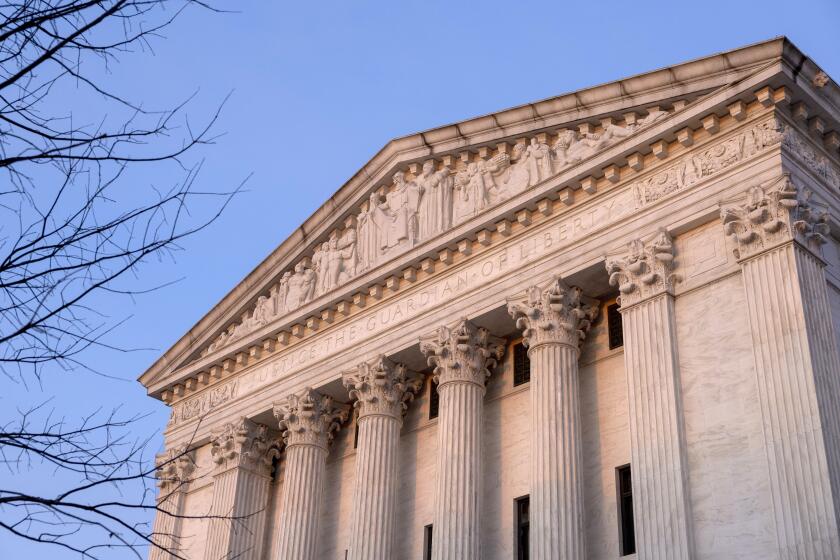Senate Deal for Asbestos Victims Trust Fund Announced
Sen. Arlen Specter (R-Pa.) said Tuesday that he had reached a bipartisan compromise to create a trust fund that would compensate victims of asbestos exposure.
The deal, which has been in the works for weeks, would create a $140-billion trust fund for individuals with asbestos-related diseases. In return, the asbestos victims would give up their right to sue.
The bill is designed to end “the worst litigation crisis in the history of the American judicial system,” said Specter, chairman of the Senate Judiciary Committee.
“This legislation provides substantial assurances of acceptable compensation to asbestos victims and substantial assurances to manufacturers and insurers to resolve, with finality, asbestos claims.”
The money for the trust fund would be provided by the insurance industry and business groups representing asbestos manufacturers and other companies that used asbestos in their products. More than 70 asbestos companies have gone bankrupt from decades of litigation and the costs of compensating victims of asbestos exposure.
But some insurance companies are opposed to the compromise and want any legislation to go further to limit future suits.
The bill’s prospects for passage in the Senate and House were not clear. The White House and Senate leadership have expressed support for a compromise in the past, but it was not clear whether they would sign on to this version. Specter said he hoped for a Judiciary Committee vote on the bill within two weeks.
Asbestos, a naturally occurring fibrous mineral, was used until the mid-1970s in a variety of products, including fireproofing material, insulation, automotive brakes, shingles and wallboard. Workers in factories where asbestos was used are considered particularly vulnerable to asbestos-related diseases -- as are their families, because the workers’ clothing would have been covered with the tiny fibers.
Two diseases have been specifically linked to inhalation of asbestos fibers: mesothelioma, a cancer of the membrane around the chest, heart or lungs; and asbestosis, a progressive scarring of the lungs that leads to chronic, sometimes fatal, breathing difficulties. Both diseases have a long latency period, appearing 15 to 30 years after exposure.
Some studies suggest that the incidence of asbestos-related diseases is increasing as more of those exposed decades ago become ill. That created difficulties in determining the size of the trust fund.
Nearly 4,000 people died in 2002 of mesothelioma and asbestosis, the National Center for Health Statistics says.
Under the terms of the bill, mesothelioma victims would get a lump-sum payment of $1.1 million in return for relinquishing their right to sue. Nonsmokers with lung cancer would also receive $1.1 million and smokers with lung cancer would receive $600,000. Victims with disabling asbestosis would receive $850,000.
“We have striven to bring a fair and efficient plan to the Congress, a plan that will ensure adequate compensation to the thousands of victims of asbestos exposure but that also will give due consideration to the industries and the insurers that should, and will, provide that compensation,” said Sen. Patrick Leahy of Vermont, ranking Democrat on the Judiciary Committee and a cosponsor of the bill. “Asbestos exposure has created a maze of arduous problems, and we have worked hard to produce a balanced bill that offers fair solutions.”
Sen. Dianne Feinstein (D-Calif.), another cosponsor, said that individuals who became ill after exposure to amphibole asbestos -- a type found in the soil and frequently released into the air at construction sites -- could also apply for compensation from the trust fund. Such exposure has been a particular problem in California.
“This is not a perfect bill, but it represents a strong bipartisan compromise, which I hope can pass the Senate,” Feinstein said.
The bill has highlighted divisions within both parties. Half the Republicans on the Judiciary Committee, led by Sen. John Cornyn (R-Texas), are opposed to the current version.
“There is a lot very positive in the bill that Sen. Specter has put together,” Cornyn said, citing provisions to limit payments to lawyers and limit the venues for future litigation.
But he said he wanted more assurances that small businesses would be adequately protected.
Under the Specter-Leahy bill, if the trust fund runs out of money, future victims will be able to pursue their claims in court.
More to Read
Get the L.A. Times Politics newsletter
Deeply reported insights into legislation, politics and policy from Sacramento, Washington and beyond. In your inbox three times per week.
You may occasionally receive promotional content from the Los Angeles Times.






